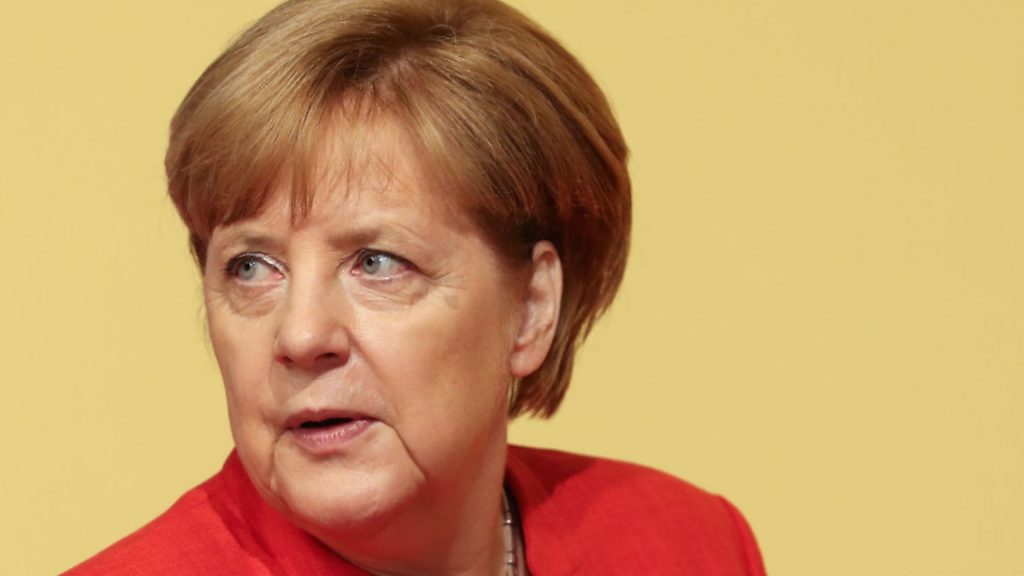
Germans are done mourning Brexit Britain. They just want to move on – and that is bad news for the UK.

The British media seemed extremely hopeful at the beginning of the summer. Angela Merkel, it seemed, was shifting on Brexit, finally sounding more flexible on future ties. But while British columnists speculated about the real meaning of the German chancellor’s statements, the German media didn’t even bother to report Merkel’s alleged Brexit rethink.
While the obsessive tea leaf-reading from the British press is understandable, it also shows a mind-boggling ignorance of how Brexit is seen abroad. I hate to break it to you, but after two months back in my native Germany I can confirm what neither the UK government nor large swathes of the UK public seem to understand: Germans don’t care about Brexit any more. They’ve got more important things to worry about, and Merkel knows this all too well.
To understand the indifference, you need to look beyond the Berlin bubble of most British correspondents. Zellhausen, a village you’ve likely never heard of, is a good place to start.
Located 25 miles from Frankfurt, Zellhausen’s residents are pretty representative of the average German, at least in the former West Germany. Many work in the famed Mittelstand – medium-sized, often family-owned, enterprises. People are down to earth. Few read in-depth coverage of Brexit in broadsheets like the FAZ or Die Zeit.
Over the summer, I talked to countless people from all walks of life, but the result was always the same; Brexit is a non-topic. People here worry about the rise of the right-wing, populist AfD, the future of healthcare and pensions, and the integration of refugees – issues with direct impact on their immediate lives.
Brexit and the future of Britain? I am sorry to say it, but, bar the odd, gloomy Anglophile, most Germans really couldn’t care less.
If Brexit is discussed at all, it’s mostly as an amusing folly, or the curious oddity of a country that had little team spirit and didn’t play by the rules, even when it was part of the club.
That some British politicians still seem to think that the UK can ‘have its cake and eat it’ provokes incredulous looks and sighs. Here, Britain is seen as a mediocre player who barged into a few practices before flouncing off with what he thought was the only ball when he wasn’t instantly made team captain.
The lack of interest is also due to the fact that many in places like Zellhausen assume that Britain is, de facto, already out. They take the exit for granted and have come to terms with it.
Even when I floated the idea of a second referendum, people just shrugged. ‘Not our problem if they cannot make up their mind,’ was a reply I heard more than once. Some were even happy to admit that they don’t feel sad to see the UK go its own way. Many have still not forgotten the extra, special conditions Britain received in the past. ‘If they decide to come back, then it should be with the same rights and privileges as everyone else. Keine Extrawürste!’, as one gentleman put it: ‘No special treatment.’
While barely anyone follows the negotiations in Brussels, there seemed to be a curious sense of pride in the EU’s negotiation performance. Not that the Germans I spoke to wanted to see the UK punished – in fact, many seemed to genuinely pity the country and especially those who voted Remain. But they don’t see why the EU’s integrity should be compromised to please someone who decided to walk away. Again, ‘keine Extrawürste’.
And so the topic consuming all of UK politics barely makes it into the average German’s top five issues. This is why Theresa May’s strategy of appealing to Merkel individually for a better deal cannot hope to bear fruit.
Any German attempt to weaken the EU line on Brexit would not only contradict the EU’s and thus ultimately our own interests – it doesn’t even make any sense, politically. Getting Brexit right does not keep Germans up at night. You cannot win votes with a sympathetic attitude towards the UK; in fact, you’d probably lose them. And that’s if anybody even noticed.
The Germans I know and talked to certainly won’t complain if Britain changes its mind and decides to backtrack on Brexit. But don’t expect them to celebrate, either.
If Brexit has achieved one thing, it has shown us a nasty side to the UK which we may have suspected but preferred to ignore. Before the Brexit vote, we had an inkling that Britain didn’t really understand or share the EU’s values and was probably just in it for the money. Most Germans were probably fine with that, as long as the UK wasn’t trying to actively harm the EU.
But the referendum and Britain’s subsequent attitude towards the EU have fundamentally fractured that tolerance. ‘It is a special type of arrogance to assume that things will just go back to the status quo ante should Britain change its mind. We don’t bear grudges. But we don’t forget, either’, as my father recently remarked. At least in Germany, Britain’s sympathy credit is all used up.
Felix Simon is the acting editor of the European Journalism Observatory based at the Reuters Institute and writes, among others, for the FAZ, Die Welt and NZZ. Follow @_FelixSimon_









